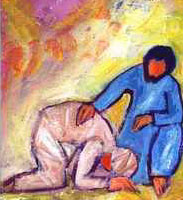|










|
|
- Eucharist celebrates
a God who is our liberator.
"The bread of God is the one who comes from heaven
and gives life to the world… I came down from heaven to
do the will of whom sent me. His will was that I should lose
none of those he gave to me but I should raise them up again
at the last day…" (John 6, 33 etc.)
To become free forever thanks to the "Son of man who gave
his life for freeing the multitude" (Mark 10, 45): it is
what we celebrate at each Eucharist. Since Vatican II Council,
the mass has recovered its spirit of liberation. During the Eucharist
prayer the Christians are standing up and not any more kneeling,
it tells that we are celebrating a God who liberates us, a God
who saves us from evil and from death.

|
First it is a gathering of people called together to celebrate
a feast with a meal during which the guests take time to look
to each other, to listen to each other, to free themselves of
their daily burden in sharing with others. |
-
- It is a time of welcome and openness, a time for becoming
aware of a hunger of some thing else: "Man does not live
only on bread but also on the words coming from God" It
is a liberation of the heart to be able to understand these words
of God.
We read our history through the first and the second Testament
and we see how God is operating to make men more human and liberated
whoever they are. We see how He is liberating the people of Israel
from slavery in Egypt or in Babylon. We see the actions of those
He specially sent for His purposes, Abraham, Moses.
-
- He was always repeating:
- "Don't be afraid! Stand up and go!"
|

|
-
- Jesus coming after a long series of prophets, brought
back life to sick persons, handicapped people (paralytic, blind,
deaf people) or victims of disasters and people without hope
for a better life " Go, you had confidence, you are safe!"
Himself he behaved like a free man even towards the Law, the
Shabbat, his only guide was "do good, save a life rather
than to lose one" Mark 3, 4).
These events that are commented and meditated during the mass,
arouse a shared and personal prayer and stimulate an attitude
of being liberated, of singing praises together with one voice
with the person who presides the thanks giving to God: "
To you, Holy Father, we give our praises, through Jesus Christ.
He is the way to you, He is the truth that makes us free, He
is the life that fills us with joy…"
We stand up also during the Holy communion, like the Hebrews
eating their bread, all dressed up to walk towards an unknown
and free land.

|
Between the departure and the arrival to the Promised Land,
there are forty years of living in the desert, a long period
of a daily testing of being liberated, already but not yet completely!
"Our fathers ate that bread and they died. Those who will
eat the bread coming from heaven will not die, he will live forever
(John 6, 49) |
We have today a status of a liberated person: then, in the Church
we can express our faith with our own words of contemporary culture,
we can relate in a partnership with the members of our community,
we can take the action of updating obsolete regulations that
hide the essential of our faith. We can follow the example of
early Christians in Antioch: they said "no" to circumcision
and they brought the case to the agreement of those in charge
in Jerusalem. In doing so they gave to the pagan access to the
Gospel (see Acts 15). Saint Paul insisted: "If Christ liberated
us, we are really free (Gal 5.1)
|
